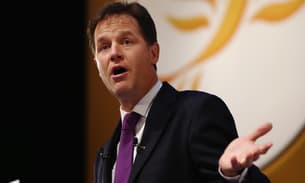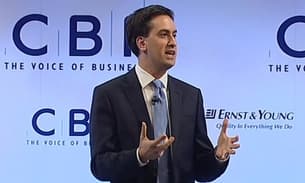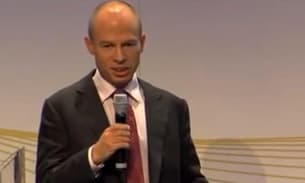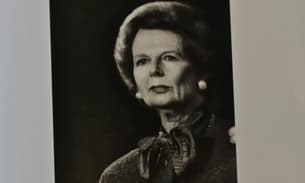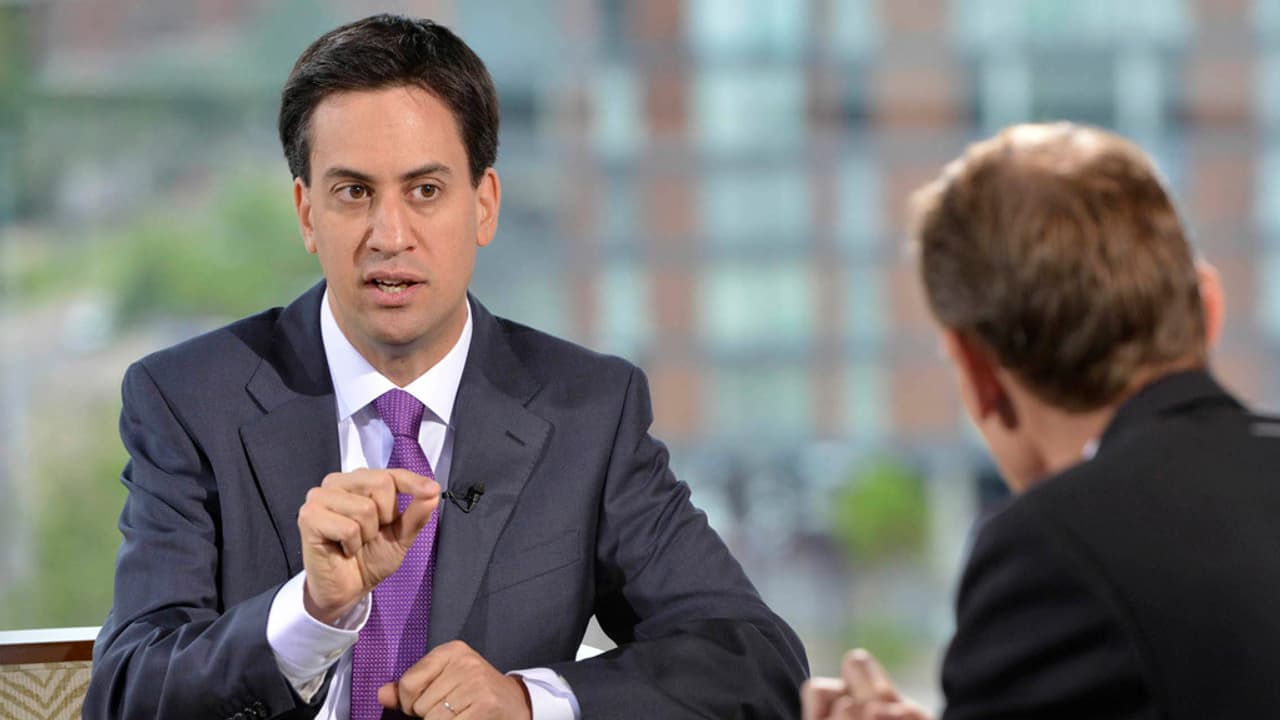
Labour’s ‘Martin Taylor’ question: Who is Miliband’s £600k donor?
Labour leader Ed Miliband on The Andrew Marr Show / BBC
Key findings from analysis of non-trade union cash donations to Labour:
- Questions surrounding series of donations to Labour under name “Martin Taylor”, totalling £591,800
- “Martin Taylor” has met Ed Miliband at least once but Labour unable or unwilling to say precisely who he is
- A published list of meetings between Miliband and donors is now more than a year out of date
- Sir Alistair Graham, former chair of committee on standards in public life, urges Miliband and Labour to live up to rhetoric on donor transparency
The first comprehensive analysis of all cash donations given to Labour from outside trade unions since the last election has highlighted concerns over the party’s pledge to be transparent about its funders.
The analysis by the Bureau of Investigative Journalism has also renewed questions about the party’s potential links to the gambling industry, with one lobbyist giving Shadow Chancellor Ed Balls’s constituency a four-figure sum.
And it also showed that cash from individuals and businesses connected to the property sector account for 20% of Labour’s non trade union financial support – the largest segment.
There is nothing to suggest any wrongdoing by any of Labour’s donors or any breaches of legal requirements by the party.
But it is the lack of details surrounding a series of donations under the name “Martin Taylor” that highlights potential questions about Labour’s commitment to the fullest transparency as well as possible flaws in the wider rules governing disclosure of political donations.
Who is ‘Martin Taylor’?
According to an analysis of Electoral Commission records, donations given by “Martin Taylor” amount to £591,800, making them Labour’s third largest cash backer from outside trade unions this parliament.
“Martin Taylor” appears to have met Miliband at least once, according to the party’s records, but Labour officials have been unwilling or unable to say precisely who he is.
Labour could be bound by privacy or data protection laws and may not have the donor’s permission to disclose information such as in which sector he works.
However, because the party accepted “Martin Taylor’s” first donation of £100,000 in October 2012, just a few months after claiming to have set new standards on the issue of donor transparency, it risks a charge of hypocrisy.
Three years ago amid a “cash for access” row about the links between Tory donors and ministers, Miliband demanded greater transparency from David Cameron.
He said he would publish a list of all meetings he had had with any donor who had given more than £7,500 to his party and he challenged the Prime Minister to do likewise.
He said at the time in March 2012: “I am very happy to publish and very happy to be transparent about what we do, who we meet… I’m very happy to be open and transparent about what we are doing.”
When Labour did publish that list a few days later, the party said Miliband had “gone further” than the Prime Minister in disclosing the links with financial supporters.
A Labour spokesman said at the time: “We promised openness and transparency and we have delivered.”
Related story: UK – Doorstep lender amongst guests worth £22bn at Tory fundraiser
Less than seven months after setting that transparency threshold, Labour accepted its first donation from “Martin Taylor”.
If “Martin Taylor” was unwilling to have any basic information about him disclosed to the public, Labour was under no obligation to accept his donation.
– Sir Alistair Graham
According to the Electoral Commission rules, parties must report all donations of more than £7,500 and carry out checks to ensure they are from a permissible source. Proxy donations – giving money to a party via a third party – are also against the rules.
The Commission says the rules were introduced “to ensure there is transparency about the funding of parties”.
Because the name “Martin Taylor” is so common, it is difficult to trace the actual individual. The Electoral Commission is even unable to confirm it is the same individual.
Nothing is known about him, such as whether he has a background in a potentially politically embarrassing sector – for example in hedge funds. Last month Labour attacked the Conservatives for accepting millions of pounds from a “select few in the hedge fund industry”.
All a Labour spokesman would say in a statement about “Martin Taylor” was: “We are grateful to all those who donate to the Labour party and are supporting our general election campaign. Labour’s members and small donors give us the largest proportion of all our income. All our donations are declared and published in line with Electoral Commission rules.”
Above: Sir Alistair Graham, former Chairman of the Committee on Standards in Public Life
Sir Alistair Graham, the former chairman of the Committee on Standards in Public Life, told the Bureau: “The Labour party should be willing to match its rhetoric on transparency about party funding with the appropriate actions as far as its own donations are concerned.
“In the example of ‘Martin Taylor’ they are open to the charge of hypocrisy.
“I urge Ed Miliband, as a potential Prime Minister, to ensure all donations accepted by the Labour party have the donor’s agreement to give full details of their background, so the public can see whether any industry or firm is seeking to curry favour or looking to influence the policies of the Labour party.”
He added the episode underlined the need for wider reform on the system of party funding. He said: “The recent events surrounding donations to political parties suggest a review of the current legislation is long overdue.
“There is a need to tighten the rules to ensure the fullest transparency about donors who are making donations over a given sum (say £5,000 compared with the current £7,500), so the public can know where exactly the money coming from and what it is intended to achieve.”
According to Electoral Commission records, “Martin Taylor” went on to make five further donations to central party funds worth £487,000 after his initial £100,000 gift in October 2012.
These were £98,000 on June 14 2013, £95,000 on December 10 2013, £81,000 on July 22 2014, £112,000 on April 4 2014, with the latest being £101,000 on December 19 2014.
Miliband meets ‘Martin Taylor’
Three weeks after making his second donation in June 2013, he appears to have met Miliband on July 3, according to the latest list of meetings published by the Labour leader’s office.
That list, which shows 93 dates on which Miliband has met donors between September 25 2010 and the end of 2013, is now more than a year out of date. The last entry for any donor is December 17 2013.
Labour refused to tell the Bureau if there had been any meetings between Miliband and “Martin Taylor” since then. It also refused to say whether an updated list would be published before May’s general election when Miliband hopes to become Prime Minister.
– Labour spokesperson
In a statement, a party spokesman said they had not decided when next to publish its list, saying merely they did so at “regular intervals”.
The party declined to say on what other dates it has previously published that list.
“Martin Taylor” has also made two separate donations to the Greenwich and Woolwich constituency Labour party: one of £4,200 on September 15 last year and £600 three months later on December 20.
It is not known if there is any connection between “Martin Taylor” and that area of southeast London.
The current MP for the constituency is former Labour minister Nick Raynsford, but he is retiring in May and Labour’s prospective candidate is now Matthew Pennycook.
Raynsford did not respond to questions about any knowledge he may have of the donations, while Pennycook referred our queries to Labour’s national headquarters, saying not even his local party treasurer would be able to help.
Ed Miliband’s office also referred all questions to the party’s central press office.
Related story: UK – Low profile United & Cecil funnels cash to Conservative must win marginals
The Bureau identified a number of individuals named “Martin Taylor” whose backgrounds suggested they might have the resources to donate more than half a million pounds. When approached, almost all ruled themselves out.
One was the former chief executive of Barclays who was friendly with Tony Blair while he was Prime Minister, but he denied he had given anything to Labour.
We also identified another possible “Martin Taylor” who could have the resources to donate almost £600,000. We formally contacted him but he did not respond to phone messages we left at his workplace or to a personal letter sent to his home address. For legal reasons, the Bureau is unable to publish any more details about him.
Due to the mystery surrounding “Martin Taylor”, the name was the most striking in a comprehensive analysis of the donations made to the party since 2010.
The analysis was carried out to provide a list and further details about the businesses and individual cash donors to Labour.
We carried out a similar exercise regarding the Conservative party in 2011. And last year we revealed details about the billionaires and lobbyists attending lavish fundraising dinners with ministers including David Cameron.
The Bureau’s sectoral analysis of Labour donations
In the Bureau’s analysis of Labour funders, we found that excluding the public money the party receives because it is in Opposition and the gifts made directly to individual candidates, donations registered with the Electoral Commission have totalled £67.7m since the last election.
There are two main types of donation to Labour: cash and non-cash ‘donations in kind’.
Non-cash donations, which totalled £9.8m, or 14.5% of the total, are usually seconded staff or office costs, but they can also include shares. For example, John Mills, boss of television shopping firm JML, gave the party shares worth £1.65m in January 2013, according to the database.
Cash donations account for £57.7m of the total, or about 85%, with direct cash gifts from trade unions being by far the biggest element. They gave £43.7m in the period, or 76% of all direct cash donations. Another £3.4m, or about 6% of cash donations, was given by smaller organisations such as unincorporated associations, the largest being £50,800 from Lambeth Labour Group.
However, Labour still receives significant direct cash support from individuals and businesses. A total of £10.6m, or about 18% of cash donations, has been given from these categories since May 2010, with £3.1m from companies and limited liability partnerships, while £7.5m has been donated by private individuals.
It is this last category that the Bureau has analysed. By examining open source records such as Companies House directorships, the Bureau has for the first time produced a full breakdown of this £10.6m to show which business sectors are backing Labour in hard cash.
Property was the largest identifiable sector, with donations totalling £2.1m, or 20% of non-trade union support. Much of this is due to the support of millionaire business partners Andrew Rosenfeld and Sir David Garrard.
The pair made their fortunes at property developers Minerva Plc, before Garrard retired and Rosenfeld moved into telecoms. Rosenfeld, who died just last month, was Labour’s largest individual or corporate cash donor in the post 2010 period, giving a total of £961,440.
Although he was once a Tory supporter – he gave a £10,000 donation to former Chancellor Kenneth Clarke in 2001 – he had pledged to give Labour a total £1.5m before May’s election.
Garrard, meanwhile, gave a total of £689,570, making him number two on the list of individual donors.
The financial services sector has been the second biggest contributor to Labour coffers since 2010, accounting for 9% of cash donations, or £972,693.
Bloomberg Tradebook Europe, the brokerage division of Bloomberg, was the largest City donor with gifts totalling £270,875. However, the firm has also donated to the other two main parties, giving cash support of £235,000 to the Liberal Democrats and £125,000 to the Conservatives in the period.
Celebrity backers and ‘Labour luvvies’
Those working in the arts and entertainment sector – sometimes referred to as the “Labour luvvies” – remain a key source of financial support for the party.
The sector accounted for gifts worth £691,579 in the period, 7% of all direct cash donations to the party.
The largest donor in this sector was Michael Foster who is the exclusive agent for Radio 2 DJ Chris Evans and other celebrities. He is now turning to politics and contesting Camborne and Redruth for Labour. In total, Foster has given cash worth £261,028 to Labour through his company Fostermco Ltd.
Other celebrity donors include comedian Eddie Izzard (£41,549) and author Ken Follett (£137,050), who writes thrillers and historical novels. His wife, the ex-MP for Stevenage Barbara Follett, also gave £94,525. She was one of several Labour donors from the political sector.
In total people who work in politics gave £545,071 to the party. The donations came from serving councillors as well as MPs from the last parliament, including David Blunkett and Tony Blair.
Blair is recorded as having donated £5,770 in cash to the party since the 2010 election. However, this month he caused controversy when he pledged to give £106,000 to the party, parcelled into £1,000 gifts to each of Labour’s target seats.
This latest donation has not been included in our analysis because it is not yet available for inspection on the Electoral Commission database.
Other notable names include former Labour spin chief Alastair Campbell, who has given two donations worth £19,800 since 2010. The Bureau has categorised him in the communications sector, which donated £117,775 in the period.
Support from the gambling industry
Several figures from the gambling industry also reached into their pockets for Labour. In total the sector has given £127,400 to the party over the last parliament.
Peter Coates, a founder of family-owned online gambling firm Bet365, was the betting industry figure who made the largest cash gifts. He gave £10,000 to the party personally in August 2012, while Hillside (New Media) Ltd, which owns Bet365, gave £75,000 in July 2010.
Another supporter in the sector was gambling lobbyist Neil Goulden, who gave £36,600. This includes a £2,600 gift to the constituency of Shadow Chancellor Ed Balls, Morley and Outwood, in February 2014.
In 2013, Shadow Business Secretary Chuka Umunna faced criticism after he accepted a £20,000 donation from Goulden, despite campaigning for powers to control the number of betting shops in his Streatham constituency in London.
Goulden is a longtime gambling executive. He was formerly the chief executive of Gala and is also a former head of the Association of British Bookmakers.
A spokesman for Ed Balls said: “Mr Goulden is a Labour party member and long standing donor to the Labour party. All donations are declared in the usual way.”
Goulden did not respond to a request to comment.
The biggest donation from the energy sector was from wind firm Ecotricity. Electoral Commission records show it has donated £120,000 to Labour, which is part of a pledge of £250,000 before the next election. The firm also donated £20,000 to the Green Party.
Methodology
The aim of the Bureau’s project was to analyse cash donations to Labour from businesses and individuals since the last election.
To do this the Bureau used donation data from the Electoral Commission. This was filtered down to show cash gifts from individuals and businesses, which included both limited companies and Limited Liability Partnerships.
As the names of businesses and individuals are not standardised, they were then processed using software that would match similar individual and company names.
Once they were processed each donation was then researched to work out who these donors were. Individuals and businesses alike were classified into sectors. This allowed us to work out the total cash donations to Labour by different industry sectors. Where the sectors for individuals and companies could not be determined they were marked as ‘unidentified’.
To build the list of the top 25 individual and corporate cash donors, the Bureau’s data specialist Max Harlow built an open source software tool to match donor companies to the names of their directors.





